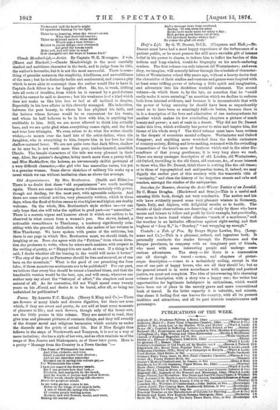Old Acquaintances. By Mrs. Brotherton. (Smith and Elder.)— There is
no doubt that these "old acquaintances " are worth meeting again. There are some tales among them written certainly with power, though not dealing, for the most part, with agreeable subjects. And there are some critical articles, very pleasantly written, which in these days, when the flood of fiction seems to rise higher and higher, are doubly -welcome. On the whole, Mrs. Brotherton's style strikes us—we can only hope that she will take the epithet in good part—as " masculine." There is a certain vigour and humour about it which are seldom to be observed in what comes from a woman's pen. She shows, indeed, a noticeable resemblance to Thackeray, a tendency significantly coin- ciding with the graceful dedication which she makes of her volume to Miss Thackeray. We have spoken with praise of the criticism, but there is one page in which Mrs. Brotherton must, we should think, be laughing at us. Does she agree with the "Pythias," from whose dicta- tion she professes to write, when he utters such maxims, with respect to the writing of poetry, as " Happy hits are made at once. If a thing is ill said, I doubt whether all the teasing in the world will make it better." "The step of the poet on Parnassus should be free and assured, as of one born on the mountain." What is the good of our preaching the lance labor, if these monstrous sentiments are to be published? For our part, we believe that every line should be recast a hundred times, and that the hundredth version would be the best, aye, and will seem, whatever our author may say about the "betrayal of effort," the simplest and most natural of all. As for correction, did not Virgil spend some twenty years on his Enid, and desire it to be burnt, after all, as being too unfinished for publication?






























 Previous page
Previous page